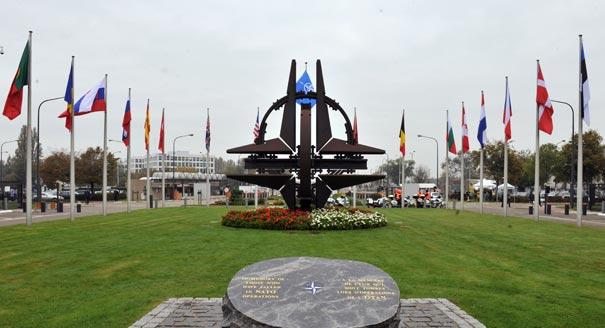- +2
George Perkovich, Malcolm Chalmers, Steven Pifer, …
{
"authors": [
"Paul Schulte"
],
"type": "other",
"centerAffiliationAll": "dc",
"centers": [
"Carnegie Endowment for International Peace",
"Carnegie Europe",
"Carnegie Russia Eurasia Center"
],
"collections": [
"Transatlantic Cooperation",
"U.S. Nuclear Policy"
],
"englishNewsletterAll": "",
"nonEnglishNewsletterAll": "",
"primaryCenter": "Carnegie Endowment for International Peace",
"programAffiliation": "NPP",
"programs": [
"Nuclear Policy"
],
"projects": [],
"regions": [
"North America",
"United States",
"Western Europe",
"Europe"
],
"topics": [
"Foreign Policy",
"Nuclear Policy",
"Global Governance"
]
}
Source: Getty
Is NATO’s Nuclear Deterrence Policy a Relic of the Cold War?
As NATO grapples with the future of its deterrence posture, it faces the contentious question of whether reducing or withdrawing forward-based U.S. nuclear weapons in Europe would unacceptably reduce the security of its member states.
The Cold War left a nuclear landscape whose remnants must still be sensitively managed. As NATO grapples with the future of its deterrence posture, it faces the contentious question of whether reducing or withdrawing forward-based U.S. nuclear weapons in Europe would unacceptably reduce the security of its member states. The weapons were intended to promote nuclear burden sharing through an Alliance-wide decision process. But the European aircraft that would drop them are aging and will need replacement or refitting. Decisions are needed soon on whether this should occur.
The United States favors still greater nuclear restraint, as it declared in its recent Nuclear Posture Review. But it is reluctant to change in Europe without the agreement of all its allies. Some member states, especially on NATO’s periphery, seek the continued assurance that they believe these theater weapons offer. Other allies see the decision as an urgent opportunity to advance the goal of the abolition of nuclear weapons. So the upcoming debate in Lisbon will require a rare combination of determination, political sophistication, and analytical clarity—and issues will likely still require resolution long after the summit.
Although significant differences between member states exist, most agree NATO should:
- Remain capable of launching a nuclear response to aggression or blackmail as long as nuclear weapons exist.
- Reassure the most exposed members about the Alliance’s capacity and commitment to defend them.
- Avoid a high-profile transatlantic difference of opinion, which would represent the fastest and most farreaching loss of collective credibility.
- Contribute to the reduction and, when possible, the elimination of nuclear weapons in the world.
To foster lasting consensus on the future shape and basing of nuclear deterrence, NATO’s leadership must pay close attention to the internal political pressures within key member states, as well as others’ perceptions of external insecurity. Both result from long-term geographical, historical, and cultural factors. A good decision on nuclear arrangements will safeguard both the Alliance’s credibility and its cohesion—and enable NATO to focus on new and emerging threats without distraction.
About the Author

Former Nonresident Senior Associate, Nuclear Policy Program
Schulte was a nonresident senior associate in the Carnegie Nuclear Policy Program, where his research focuses on the future of deterrence, nuclear strategy, nuclear nonproliferation, cybersecurity, and their political implications.
- Looking Beyond the Chicago Summit: Nuclear Weapons in Europe and the Future of NATOPaper
Recent Work
Carnegie does not take institutional positions on public policy issues; the views represented herein are those of the author(s) and do not necessarily reflect the views of Carnegie, its staff, or its trustees.
More Work from Carnegie Endowment for International Peace
- How Far Can Russian Arms Help Iran?Commentary
Arms supplies from Russia to Iran will not only continue, but could grow significantly if Russia gets the opportunity.
Nikita Smagin
- Is a Conflict-Ending Solution Even Possible in Ukraine?Commentary
On the fourth anniversary of Russia’s full-scale invasion, Carnegie experts discuss the war’s impacts and what might come next.
- +1
Eric Ciaramella, Aaron David Miller, Alexandra Prokopenko, …
- Indian Americans Still Lean Left. Just Not as Reliably.Commentary
New data from the 2026 Indian American Attitudes Survey show that Democratic support has not fully rebounded from 2020.
- +1
Sumitra Badrinathan, Devesh Kapur, Andy Robaina, …
- Taking the Pulse: Can European Defense Survive the Death of FCAS?Commentary
France and Germany’s failure to agree on the Future Combat Air System (FCAS) raises questions about European defense. Amid industrial rivalries and competing strategic cultures, what does the future of European military industrial projects look like?
Rym Momtaz, ed.
- Promoting Responsible Nuclear Energy Conduct: An Agenda for International CooperationArticle
These principles aim to codify core responsible practices and establish a common universal platform of high-level guidelines necessary to build trust that a nuclear energy resurgence can deliver its intended benefits.
Ariel (Eli) Levite, Toby Dalton














